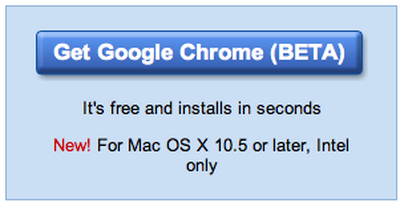Google Releases Chrome for Mac Beta
As
anticipated, Google has finally
released an official beta version of its Chrome browser for Mac. The initial beta version, termed Build 4.0.249.30, requires Mac OS X Leopard or Snow Leopard, and is only compatible with Intel-based Macs. In addition to the Mac release, Chrome for Linux has also been promoted to a beta version.
While developer builds of Chrome have been available for nearly six months, only now does Google consider it full-featured enough and stable enough to promote to its "Beta" release channel. Work will continue on Chrome with additional Developer Preview releases occurring on a regular basis. Refined versions will then periodically (approximately monthly) be released as new additions to Chrome's Beta channel. Releases will eventually make their way to Chrome's "Stable" channel, which will offer "rock solid" performance without the inclusion of features still under development and testing.
Chrome for Windows launched as a beta version in September 2008, with Google co-founder Sergey Brin admitting only days later that the lack of a Mac version at the time was "embarrassing". At the time, he hoped that a Mac version would be available in only a "matter of months", and the company announced in January that it was targeting a Mac release for the first half of 2009. While developer versions of Chrome did appear within that timeframe, it has taken an additional six months for developers to sufficiently refine it to be considered a beta release for more general consumption.
Popular Stories
Apple today released iOS 18.4 and iPadOS 18.4, the fourth major updates to the iOS 18 and iPadOS 18 operating system updates that came out last year. iOS 18.4 and iPadOS 18.4 come two months after Apple released iOS 18.3 and iPadOS 18.3.
Subscribe to the MacRumors YouTube channel for more videos.
The new software can be downloaded on eligible iPhones and iPads over-the-air by going to...
While the iPhone 17 Pro and iPhone 17 Pro Max are not expected to launch until September, there are already plenty of rumors about the devices.
Below, we recap key changes rumored for the iPhone 17 Pro models as of March 2025:
Aluminum frame: iPhone 17 Pro models are rumored to have an aluminum frame, whereas the iPhone 15 Pro and iPhone 16 Pro models have a titanium frame, and the iPhone ...
Apple's big developer event is a little over two months away, and rumors about what we can expect to see in Apple's next major operating system updates are becoming increasingly frequent.
A public release of iOS 18.4 is also imminent with a number of updates and improvements, although we won't be getting the major Apple Intelligence Siri upgrades that had reportedly been planned for this...
iOS 19 will not be available on the iPhone XR, iPhone XS, or the iPhone XS Max, according a private account on social media site X that has accurately provided information on device compatibility in the past.
The iPhone XR, iPhone XS, and iPhone XS Max all have an A12 Bionic chip, so it looks like iOS 19 will discontinue support for that chip. All other iPhones that run iOS 18 are expected...
Apple is reportedly working on a new Magic Mouse. Below, we recap what to expect.
The two key rumors for the Magic Mouse 3 so far include a relocated charging port, along with a more ergonomic design.
It was briefly rumored that the Magic Mouse 3 would also feature voice control, but that was misinterpreted information.
Relocated Charging Port
While the Magic Mouse switched from...
With the second release candidate of iOS 18.4 that Apple seeded out today, the company finally provided us with release notes that give a full rundown on what to expect.
There's an Apple Vision Pro app, new Apple Intelligence features for notifications and additional language support, plus an Apple News Food feature for Apple News+ subscribers, and several updates that should improve the...
We've been hearing rumors about a foldable iPhone for almost a decade now, but it looks like we might finally see the device come to fruition in 2026. We're going to be waiting many more months for the foldable iPhone, but so far we're hearing good things.
Apple wants to make it creaseless. It's taken Apple multiple years to design a foldable iPhone that it's satisfied with because Apple ...
Multiple sources have claimed that iOS 19 will introduce a new design with more translucent buttons, menus, notification banners, and more, and there is now another clue that points towards this glass-like appearance.
Bloomberg's Mark Gurman today said the new design project is codenamed "Solarium" internally. A solarium is a room with glass walls that allow in plenty of sunlight, so this...























